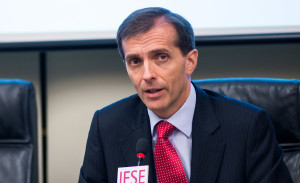IESE Dean Jordi Canals to Step Down After 15-Year Reign

Jordi Canals: IESE Dean
Jordi Canals, Dean of the IESE Business School, a part of the University of Navarra, has been successful in revolutionising the method of imparting education in the institution. He has fostered a sense of responsibility towards society and a thirst for a purposeful life in students who were, initially, single-mindedly focused on landing a job with a lucrative pay and minting money for the rest of their careers. Such has been the deep-seated impact of this notable leader in the history of IESE.
Canals steps down from his position as Dean
On the 30th of March this year, an official announcement stating the withdrawal of Jordi Canals from the position of Dean, currently in his 15th year, was made. He would proceed to resume his initial role as a professor of Economics and General Management.
However, Canals would serve as Dean until August, 2016, during which time the Advisory Search Committee would be constituted and would appoint his replacement by June 2016.
Canals – A Man of Exemplary Qualifications
With an impeccable academic and work profile, Canals remains one of the finest academics that IESE has ever seen. He hold a Ph.D. in Economics from the University of Barcelona. He served as the Guest Scholar at the International Monetary Fund and the Brooking’s Institution and is also a recipient of a Postdoctoral Fellowship from the Harvard Business School.
Canals has authored numerous books, including ‘Shaping Entrepreneurial Mindsets’ (2015) which deals with the challenges that tag along with rapid sustainable corporate growth, ‘Building Respected Companies’ (2010), ‘Universal Banking’ (1997) and ‘Managing Corporate Growth’ (2000).
Role in placing IESE on the Global Map
When Canals took over the Deanship in 2001, IESE was still finding its feet as a leading global business school.
Despite facing opposition at a time when 60% of the students in the graduate MBA program were from Spain, Canals marched forth and unabashedly recruited faculty from all over the globe, and accepted applications from students, worldwide. This process was successful to such an extent that 85% of the student population today in the MBA program is non-Spaniard. Canals’s theories of internationalization, when put to rigorous execution, were successful in establishing IESE as a global brand. Today, IESE sits proud at the 16th position in Financial Times’s list of the top business schools in the world (9 places lower than its 2015 7th rank).
Canals has taken the philosophy and mission of IESE to various places. IESE, now, has centers for its executive programs in New York (2010), Sao Paulo (2011) and Munich (2015). Under Canals’s leadership, IESE has been able to extend its wings by launching associated schools in Latin America and Africa, and especially through The Africa Initiative.
When first offered the position of Dean, Canals was initially hesitant, “I told the President you are making a mistake because I am a scholar. I enjoy teaching and research. I have a passion for education. So I thought, ‘Well, this is not going to work. So anytime you think that I am not doing a good job or if senior faculty thinks I am doing a lousy job, tell me and I’ll step down.’ The guy has been keeping me for a number of years now.” This alone sheds light on Jordi Canals’ dedication, his perseverance, and his sole motive of improving the equality of education at IESE and making it accessible to students, worldwide.
With the reins of control now renounced by Jordi Canals, the new Dean has his task cut out for him. He will have to maintain, if not further, the supreme standards that Canals had brought IESE to.
